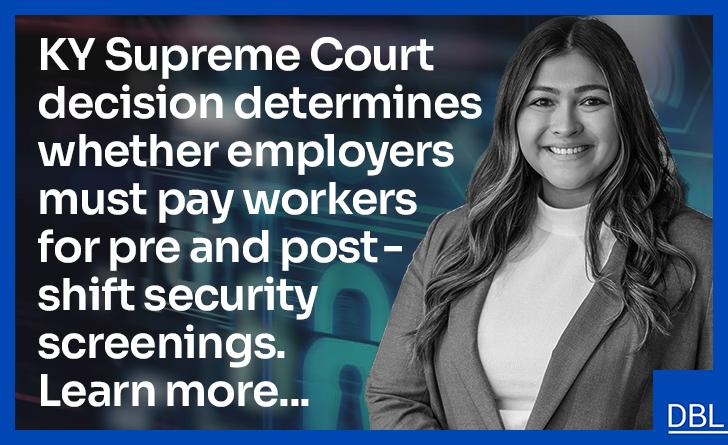In a 4-3 decision, the Kentucky Supreme Court determined that pursuant to Kentucky Wage and Hour law, employers are not required to pay workers for time spent undergoing preliminary and postliminary work security screenings.
The case involved a wage-and-hour class action filed in 2007 against UPS, alleging that UPS violated KRS Chapter 337 by failing to compensate class members for time spent complying with mandatory security procedures upon entering/exiting UPS facilities. UPS argeed that the time for which the class was seeking compensation – time spent waiting for and undergoing security screenings – was not compensable under Kentucky law. The Kentucky Court of Appeals agreed with UPS. The Class appealed, and the case came before the Kentucky Supreme Court.
The Fair Labor Standards Act (FLSA) is the federal employment law that defines employer obligations relating to employee wages, hours, overtime, and child labor. The Portal-to-Portal Act of 1947 amended the FLSA to clarify the definition of compensable workday. Under the Act, employers are required to compensate workers for performing activities that are indispensable to job performance, such as changing clothing after handling toxic materials. However, commuting to and from work and preliminary work duties are not compensable activities. The KRS Chapter 337 contains similar provisions to the FLSA, and delineates prohibited wage and hour practices of employers.
While KRS Chapter 337 is silent on whether preliminary or postliminary activities constitute compensable work or time on the job, the Court relied upon statutory construction principles, state administrative interpretation, and federal law to answer the question at issue. The Court determined that the Kentucky Administrative Regulations has incorporated the Portal-to-Portal Act’s compensation limits for nearly half a century, by incorporating federal standards into the definition of “travel time,” and “hours worked.” Additionally, Kentucky’s administrative regulations includes language from the Portal-to-Portal Act, which the court explained, “strengthened the connection,” between KRS Chapter 337 and the Portal-to-Portal Act. Finally, the Court relied upon federal caselaw from the United States Supreme Court and the Sixth Circuit Court of Appeals, which had both previously held security screenings are non-compensable activities under the FLSA. Most convincing, the Sixth Circuit held that anti-theft security screening requirement for workers was not compensable under the FLSA, the Portal-to-Portal Act, nor KRS Chapter 337.
Thus, the Kentucky Supreme Court held that KRS Chapter 337 encompasses the federal Portal-to-Portal Act provisions, which makes preliminary and postliminary activities, such as work security screens, non-compensable, and affirmed the judgment of the Court of Appeals.





